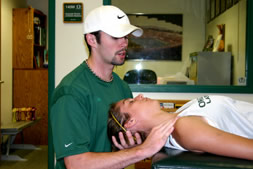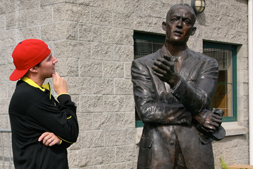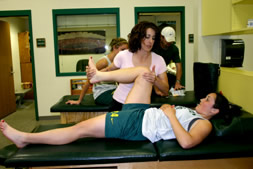Frequently Asked Questions
- Expectations for graduate school?
- Why a post-professional athletic training masters program?
- Graduate assistantships?
- Cost of living?
- GRE scores?
- How do we rank applicants?
- Opportunities for teaching?
- Summer opportunities?
- Will you develop important relationships here?
- Insight from current student?
- Will I become a better athletic trainer?
Expectations for graduate school?
Graduate school is a time to take charge of your education and experiences. Students can expect to be challenged academically, clinically and professionally. The bar has been set and we have very high expectations, but you have a broad support system to help you attain your goals. Find out what alumni Tonya, AJ, Katie, Craig, Eric and Becky said when we asked them the following question: What would you tell an applicant to ensure their expectations about our program were as accurate as possible?
Why a post-professional athletic training masters program?
Why would you want to pursue our program, instead of a graduate program in a supporting discipline? We agree with Chris Ingersoll and Ken Knight who published an article on this topic in the NATA News. Post-professional programs like ours do not repeat the information from your undergraduate education. Instead, we provide advanced experiences that include: critiquing scientific publications to support your evidence based practice, communicating professionally in written form and spoken word, developing and facilitating educational materials for both undergraduate and graduate athletic training education, learning and practicing advanced therapeutic assessment and techniques, and pursuing your own scholarly contribution to the field of athletic training. But why take my word for it…find out what alumni Tonya, AJ and Becky have to say.
We have 8 graduate assistantships in athletic training (we call them graduate employee or GE positions). They all include a full tuition waiver and a health benefit, and most are the maximum graduate student FTE of 0.49 (~20 hours/week) which pays a stipend of approximately $1000/month. The only student fee you must pay is about $275 per term, each of the 3 terms per year. Most of our GE positions start August 1st, even though school is not in session until the end of September.
One of our graduate students said he lives by himself and his rent is $575/month, and with most of his other bills he gets by with $1100/month. If you share your accommodations, you can reduce that even further.
We typically do not accept students that are unable to obtain GRE scores of 150 on both verbal and analytical portions (new scoring system) or a combined GRE score of 1050 with Verbal and Quantitative score of 450 (old scoring system). We do not, however, mind if students re-take the exam to obtain the necessary scores, and the highest score from each category will be considered across multiple attempts.
Success in our graduate program requires a balance between academic success, clinical skills and positive professional/personal behaviors. The first person to look at the applications is the program director, Dr. Grace Golden, who ranks applications based on all three of these areas using the GPA/transcripts, GRE scores, work sample, cover letter and reference letters. Applicants who do not meet the minimum GPA of 3.00, the minimum GRE scores (Verbal score 150, Analytical score 150), or have weak work samples or letters of recommendation are not typically considered further. After this initial screening the associate director of athletic medicine, Kim Terrell, reads over the applications for the top 10-15 applicants. At this point, top applicants begin to receive phone calls from Grace or Kim, in addition to current students and athletic training staff. Once everyone’s feedback has been tallied, the remaining top applicants are asked to visit for an interview. Successful applicants are offered a spot in our academic program, and a specific GE position. Typically offers are made by mid-February.
We have many opportunities for graduate ATC's interested in pursuing a career that involves teaching. Each term there are teaching opportunities which might include: instructing sports medicine laboratories, organizing and developing undergraduate course curriculum, facilitating undergraduate lectures, and mentoring undergraduate students in the athletic training room. We have also developed a seminar for graduate students interested learning about various teaching techniques, titled College Science Teaching.
Classes are not in session in the summer, and students are free to work or return home during the summer. Many of our graduate students chose to stay in Eugene and work as an athletic trainer at camps hosted by the University of Oregon to supplement their income.
Will you develop important relationships here?
The University of Oregon has a rich history in athletic training education and the network of UO alumni is wide spread (just stop by the UO alumni party at the NATA convention to meet some of the many alumni). Our current program faculty and clinical educators are very supportive and typically develop strong and long-standing relationships with our students. Find out what Tonya, AJ, Greg, Eric and Becky have to say on this topic, as they answer the following question: “Do you believe that as a member of our graduate AT program you have developed important relationships that will provide you with professional or personal support in the future?”
Find out what alumni Tonya, Katie, Craig and Becky said when we asked them the following question: What insight about graduate school do you now have that you wish you had when you were applying to graduate programs?
Will I become a better athletic trainer?
Most of our graduate students plan to continue practicing as athletic trainer once they have completed our program. For this reason, we ensure that each member of our program has an opportunity to practice in a clinical athletic training setting, and we have added hands-on courses in manual therapy to the curriculum. We also believe that the academic curriculum directly reinforces the critical thinking, decision making process, and content our students will use everyday in the clinical setting. Find out what Tonya, AJ, Katie, Heather, Craig, and Greg thought about this question.
Save The Date
Interviews for our top applicants
will be held the weekend
of Jan.
25-27 2019.
If you think
you are a strong candidate...
please keep that
weekend open!
On Campus
Eugene Music
- The Shedd
- KLCC Music Calendar
- The Saturday Market
- The Hult Center
- The WOW Hall
- McDonald Theatre
- Sam Bond's Garage
- Cozmic Pizza


